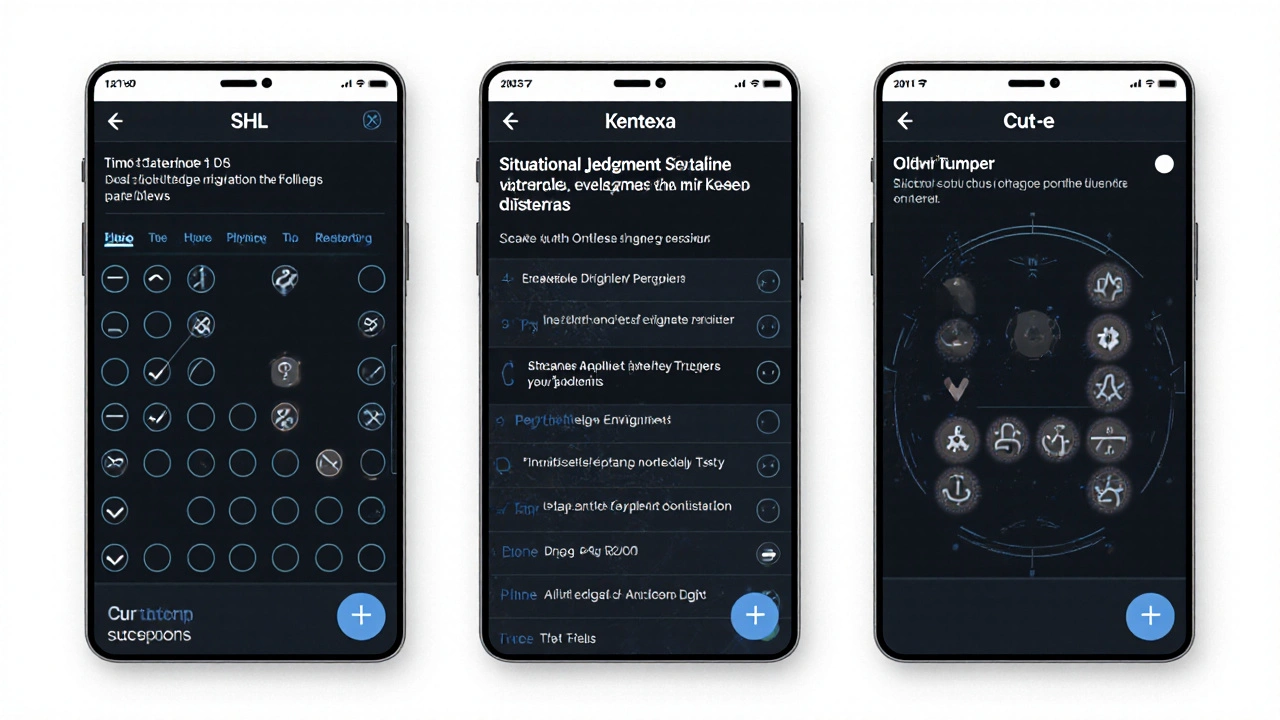
If you're applying for a graduate job in the UK, you’ve probably already been told you’ll face a psychometric test. Maybe you’ve even started one-and froze when the timer kicked in. You’re not alone. Thousands of graduates each year get filtered out not because they lack skills, but because they didn’t prepare properly for these tests. The good news? You can learn how to pass them. And it doesn’t take months.
What Exactly Are Psychometric Tests?
Psychometric tests are standardized assessments used by employers to measure your abilities, personality traits, and behavioral tendencies. In UK graduate recruitment, they’re usually the first gate after you submit your CV. Companies like PwC, Barclays, Deloitte, and Unilever use them to sort through hundreds of applications quickly. These aren’t IQ tests. They’re designed to predict how well you’ll fit into a role and team.
There are two main types you’ll see:
- Cognitive ability tests - measure how fast and accurately you solve problems. These include verbal reasoning, numerical reasoning, and logical reasoning.
- Personality questionnaires - ask you to rate how much you agree with statements like “I prefer working alone” or “I stay calm under pressure.” These don’t have right or wrong answers, but they do reveal your work style.
Employers use these together. A high score in numerical reasoning might get you past the first round, but if your personality profile clashes with the company culture, you won’t get an offer. That’s why preparation matters.
Who Are the Main Test Providers in the UK?
Not all psychometric tests are the same. Different companies use different providers. Knowing who’s behind the test changes how you prepare.
SHL is the most common. You’ll see SHL tests at over 70% of UK graduate employers. Their numerical tests often give you 18 questions in 25 minutes. That’s less than 90 seconds per question. Their verbal tests use dense business passages. Practice under timed conditions-this is where most people fail.
Kenexa (now part of IBM) is another big one. Their tests are similar to SHL but sometimes include situational judgment questions. These ask you to pick the best response to a workplace scenario. For example: “Your team misses a deadline. What do you do?” There’s no single correct answer, but recruiters look for collaboration, accountability, and initiative.
TalentLens (formerly Raven’s) focuses on abstract reasoning. You’ll see patterns of shapes and have to pick the next one. It’s not about math-it’s about spotting rules. If you haven’t seen these before, they feel impossible. But once you know the patterns (rotation, reflection, shading shifts), they become predictable.
Cut-e (Aon) is growing fast, especially in tech and consulting. Their tests are interactive. Instead of multiple choice, you might drag and drop answers or sort statements by priority. They also use adaptive testing: if you get a question right, the next one gets harder. This means you can’t guess your way through.
Don’t waste time studying every provider. Focus on the top three: SHL, Kenexa, and Cut-e. Most graduate schemes use one of these.
How to Practice Effectively
Practicing randomly won’t help. You need a plan.
- Start with free sample tests - Visit the official websites of SHL, Kenexa, and Cut-e. They offer free practice questions. Don’t skip this. These are the closest to the real thing.
- Time yourself from day one - If the real test gives you 20 minutes for 20 questions, practice with the same limit. No extra time. No pausing. This builds pressure resistance.
- Review every mistake - Don’t just move on after a wrong answer. Ask: Why did I get it wrong? Was it a misread? A calculation error? A misunderstanding of the question type? Write it down.
- Focus on weak areas - If you’re great at verbal but struggle with numerical, spend 70% of your practice time on numbers. Graduates often underestimate how much math they’ve forgotten since school.
- Simulate the real environment - Take tests on a laptop, in a quiet room, with no phone nearby. Use a calculator if allowed. If you’re not allowed one, practice without it. Some tests ban calculators completely.
Most people think they need to practice for weeks. You don’t. Two weeks of focused practice-30 minutes a day-is enough to move from average to above average. The key is consistency, not volume.

Verbal Reasoning: Don’t Get Tricked
Verbal tests give you a paragraph and ask: “True, False, or Cannot Say?” The trick? The answer isn’t always obvious. You have to stick strictly to what’s written.
Example: “Company X increased its revenue by 12% last year. Employee satisfaction scores rose by 8%.”
Question: “Higher revenue caused higher employee satisfaction.”
Answer: Cannot Say. The paragraph shows both increased, but doesn’t link them. Many candidates pick “True” because it sounds logical. But logic doesn’t matter here-only evidence.
Tip: Underline key words in the passage and the question. Look for absolute terms like “always,” “never,” “all,” or “none.” These often make a statement false.
Numerical Reasoning: Brush Up on Basics
You won’t need calculus. You’ll need percentages, ratios, averages, and basic graph reading. If you haven’t done math since GCSE, refresh these.
Common question types:
- “What was the percentage increase in sales from Q1 to Q2?”
- “If the UK market share is 22%, and total sales are £450m, what’s the UK value?”
- “Which region had the highest growth rate?”
Use a calculator. Even if the test says you can’t use one, practice with one. It saves time. Learn shortcuts: 10% of £320 is £32, so 5% is £16, 20% is £64. You don’t need to multiply 320 × 0.2.
Watch out for units. A chart might show sales in “millions,” but the question asks for “thousands.” That’s a classic trap.
Personality Tests: Be Yourself-But Strategically
There’s no “best” personality. But there’s a “best fit” for the role. A consulting firm wants someone who’s assertive, organized, and resilient. A charity might prefer empathy and teamwork.
Don’t try to fake it. Test providers use consistency checks. If you say you’re “always calm under pressure” and later say “I often panic in deadlines,” you’ll be flagged.
Instead, research the company culture. Look at their website, LinkedIn, Glassdoor reviews. What words do they use? “Collaborative”? “Innovative”? “Fast-paced”? Align your answers with those values.
Example: If the company says “we value initiative,” answer “strongly agree” to statements like “I often suggest new ways to improve processes.”
Also, avoid extremes. Saying you’re “never late” or “always the life of the party” sounds unrealistic. Go for balanced, professional responses.

What to Do the Night Before
Don’t cram. Don’t try new practice tests. You’ll just stress yourself out.
- Get 7-8 hours of sleep. Fatigue kills test performance more than lack of prep.
- Prepare your tech: charged laptop, stable internet, quiet room.
- Have water and a snack ready. Some tests let you take breaks; others don’t. Assume they don’t.
- Read the instructions again. Many people lose points because they misread how to answer.
What Happens After the Test?
Some companies give feedback. Most don’t. If you fail, you’ll usually get an email saying “we’ve decided not to progress your application.” It’s not personal. It’s statistical.
If you passed, you’ll likely move to a video interview or assessment center. Keep practicing. The next stage is harder.
And if you didn’t pass? Don’t give up. Many top graduates failed their first psychometric test. Use the experience. Note which sections were hardest. Practice those again. Apply to other companies. Different firms use different tests. You’ll get better with each try.
Final Tip: Treat It Like a Skill, Not a Barrier
Psychometric tests aren’t designed to trick you. They’re designed to find people who can handle pressure, think clearly, and adapt quickly-skills every graduate needs. The more you practice, the less intimidating they become. By the time you sit the real test, you won’t be nervous. You’ll be ready.
Are psychometric tests fair for international graduates?
Yes, but they can be harder if English isn’t your first language. Verbal reasoning tests rely heavily on nuanced language. Practice with UK-specific business texts. Use resources like The Financial Times or The Guardian’s business section. Focus on understanding context, not just vocabulary. Many international graduates pass with strong preparation.
Can I retake a psychometric test if I fail?
Usually not for the same role. Most companies have a 6-12 month waiting period before you can reapply. But you can apply to other companies. Each one uses different tests. Your first failure doesn’t define you. It just tells you where to improve.
Do all UK graduate jobs require psychometric tests?
No. Smaller companies, startups, and some public sector roles skip them. But most large employers-especially in finance, consulting, engineering, and law-use them. If you’re targeting top graduate schemes, assume you’ll face one. Don’t risk it.
Is it okay to use a calculator during numerical tests?
It depends on the test. SHL and Kenexa often allow calculators for numerical tests. Cut-e sometimes doesn’t. Always check the instructions before you start. If unsure, assume you can’t use one and practice without it. Better to be prepared for the worst-case scenario.
How long do psychometric test results take to come back?
Usually 2-5 business days. Some companies automate results and notify you within 24 hours. Others take longer if they’re reviewing a large pool of applicants. If you haven’t heard back after a week, it’s okay to send a polite follow-up email to the graduate recruitment team.